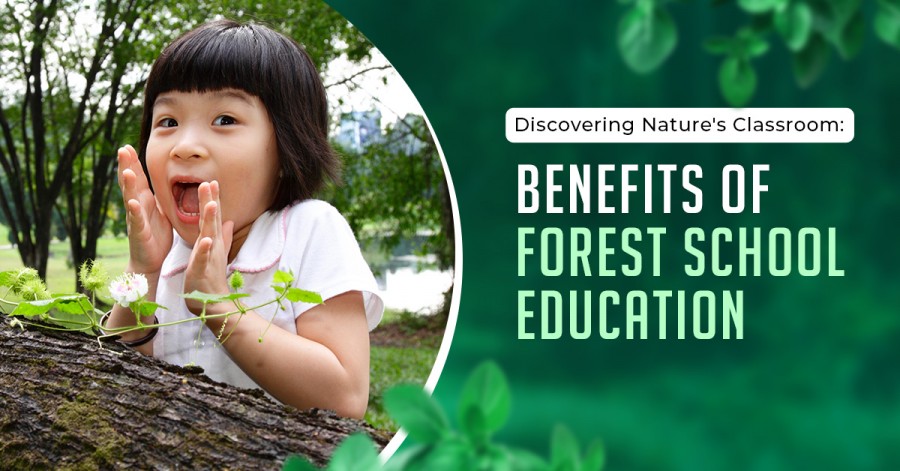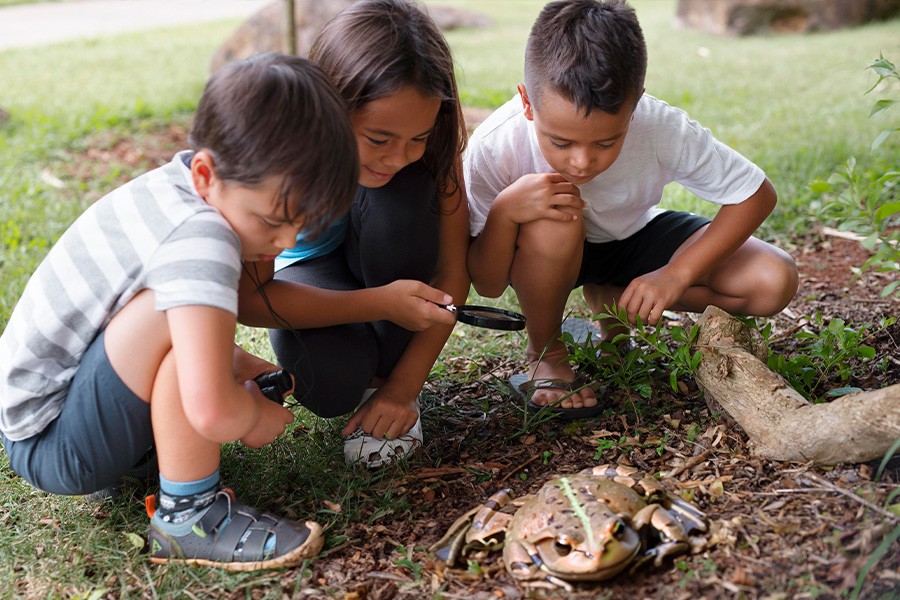Discovering Nature's Classroom: Benefits of Forest School Education
Published 10 April 2024 at 10:15
Tickikids Blog Singapore > Education > Discovering Nature's Classroom: Benefits of Forest School Education

In an era marked by screens and concrete, the concept of Forest School education is a breath of fresh air - quite literally. Originating in Scandinavia in the 1950s, forest school learning has gained traction worldwide as an alternative approach to traditional classroom learning. Instead of desks and whiteboards, students roam through wooded areas, learning from the natural environment around them.
You May Also Like: 6 Easy Plants And Flowers That Kids Can Grow
Through outdoor play and exploration, children develop physical skills, social-emotional competence, creativity, and problem-solving abilities. Climbing trees, building forts, and navigating natural landscapes promote physical coordination, teamwork, and resilience. Let's delve into the myriad benefits this outdoor educational model offers!
Connection with Nature

Image Credit: freepik
Forest School education fosters a deep and lasting connection with nature. In an era dominated by technology and urbanisation, this connection becomes increasingly vital. Children explore forests, fields, and streams, developing an appreciation for the outdoors. By immersing young learners in the rich tapestry of the natural world, nature pedagogy facilitates a profound connection with the environment, fostering a sense of wonder, curiosity, and reverence for the natural world.
Forest School serves as a catalyst for cultivating a deeper relationship with nature. By engaging with the outdoors, students develop a heightened appreciation for the beauty and complexity of the natural world, learning to observe, interpret, and respect the rhythms of nature, forging a bond that extends beyond the classroom walls. What is important: this connection instills a sense of stewardship for the environment from an early age, nurturing future generations of environmentalists!
Holistic Development
Unlike traditional education, which often focuses solely on academic achievement, learning at Forest School emphasises holistic development, regarding each child as a complete individual, encompassing physical, intellectual, emotional, social, cultural, moral, and spiritual aspects.
- Physical activities include navigating woodland terrain, like walking on logs and climbing trees, as well as tasks such as shelter building, carving, knot tying, and fire starting. Sensory experiences are enriched by immersing in the woodland environment.
- Intellectual engagement involves planning and discussing natural shelter construction, as well as creating art with materials found in nature. This fosters the development of language skills and the ability to reflect on experiences.
- Emotionally, children find calmness without time constraints, learn perseverance in task completion, and develop resilience by attempting tasks again. They also experience satisfaction in achieving their goals.
- Socially, there's cooperation and collaboration among group members in activities like gathering firewood, building shelters, or engaging in creative endeavours.
- Moral and spiritual growth occurs through the development of fair game rules by children themselves and through fostering respect and care for the woodland environment.
By immersing children in natural habitats, Forest School education cultivates a sense of environmental awareness and responsibility. Students learn about ecological systems, biodiversity, and sustainability firsthand, empowering them to become informed global citizens. This environmental literacy is essential for addressing pressing issues such as climate change and habitat destruction.
You May Also Like: 10 Engaging Indoor Activities to Keep Kids Entertained
Enhanced Learning Outcomes
.jpg)
Image Credit: depositphotos
Studies have shown that learning in natural settings enhances cognitive functioning and academic performance. Forest School lessons encourage curiosity and inquiry-based learning, sparking a natural sense of wonder in children. Observing wildlife, identifying plants, and experimenting with natural materials stimulate intellectual growth and creativity.
Forest School commonly involves a diverse range of activities that immerse participants in nature and foster a deep connection with the environment. These activities include constructing dens using natural materials or tarps and ropes, mastering fire building skills essential for survival, and preparing wholesome meals with safe and healthy ingredients sourced from the surrounding wilderness. Children also engage in creative craft activities utilising materials found in the forest, while exploring the fascinating world of bugs and wildlife. Tracking and identifying animals adds an element of excitement and learning about the ecosystem.
Kids learn to use simple tools to craft wooden items, honing their practical skills while nurturing a sense of resourcefulness. Sensory exercises are incorporated to heighten awareness of the woodland environment, encouraging a deeper appreciation of nature's intricacies. Climbing trees, balancing on logs, and indulging in mud and water play allow for physical exploration and fun, promoting a sense of freedom and adventure. Simple gazing at clouds and the canopy above provides moments of tranquility and reflection, fostering a profound connection with the natural world!
Sense of Adventure
Spending time in nature has been linked to improved mental health and emotional well-being. Eco-education provides a nurturing environment where children can develop self-confidence, resilience, and emotional regulation skills. Away from the pressures of standardised testing and peer competition, kids have the freedom to explore, take risks, and learn from their experiences. Learning at Forest School encourages a sense of adventure and exploration. Whether it's discovering hidden trails, tracking animal footprints, or splashing in puddles, every day offers new opportunities for discovery! Children develop a sense of wonder and curiosity about the world around them, fostering a lifelong love of learning.
Resilience and Risk Management
Outdoor environments present inherent risks, from uneven terrain to unpredictable weather. Forest School education teaches children to assess and manage risks responsibly, building resilience and self-reliance.
In the Forest School setting, there are inherent risks even before introducing tools like saws, billhooks, and knives. A fundamental aspect of Forest School is empowering children to engage in controlled risks. Understanding and managing these risks is paramount to ensuring a safe and enjoyable experience for the group. Learning to navigate natural hazards fosters a sense of confidence and adaptability that serves students well throughout their lives.
Regrettably, in today's society, there's a tendency to shield ourselves and others from risks. Recent research indicates that by excessively protecting children from risks, we inadvertently hinder their development for adulthood. Living in an overly sheltered environment deprives children of the opportunity to learn how to understand and manage risks independently. Paradoxically, this lack of exposure to risks may actually put individuals in greater danger when they encounter risks later in life. Balancing risk-taking is crucial, both in everyday life and within the Forest School setting, as it fosters resilience and adaptability without compromising safety!
Guardians of Tomorrow's Wilderness
.jpg)
Image Credit: depositphotos
By immersing children in outdoor environments, Forest School educational model fosters a deep connection with nature and cultivates environmental stewardship. As we strive to nurture the next generation of global citizens, embracing the benefits of forest school education is a step towards building a more sustainable and harmonious future. Being the caretakers of the natural world, children at The Forest School become champions of environmental stewardship! Armed with understanding and empathy, they inherit the responsibility of preserving and protecting our planet for future generations.
Hopefully, the next generation of individuals - children currently engaged in environmental education programs - play a crucial role in shaping the future of our planet. As stewards of the Earth, they carry the responsibility of addressing pressing environmental issues, such as climate change, habitat destruction, and biodiversity loss. Through early Forest School education, advocacy, and action, these future guardians are empowered to make positive contributions to the health and well-being of our natural world. Their dedication, passion, and commitment to environmental stewardship hold the promise of a brighter, more sustainable future for all living beings on Earth!